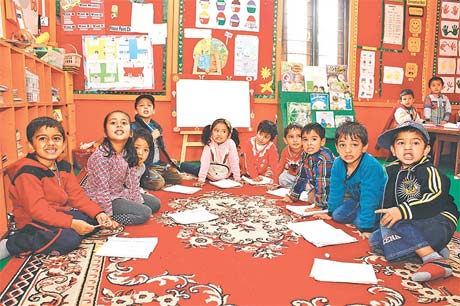Paradigm shift in school education

If there is any sector that has seen huge policy transformation post statute promulgation, it’s undoubtedly the education sector. In June 2016, the Legislature-Parliament, through the amendment on Education Act, scrapped the provision of higher secondary schooling system and categorised grade one to eight as primary and nine to 12 as secondary education. The Higher Secondary Education Board, which regulated education of grade 11 and 12, was transformed into Central Examination Board with the authority to conduct the examinations of grade 10, 11 and 12.
The amendment also paved the way to end School Leaving Certificate examinations, which boasted over 75 years of history, and replaced it with Secondary Education Examination (SEE). The decade-long practice of examination was also replaced with letter grading. With local governments coming into effect, there has been even more transformation in the school education. The entire authority of the school level education has now come under the 753 local governments. Constitutionally, the local governments can design their own curriculum, provide licence for setting up schools or upgrading them, regulate and monitor them, hire the teachers, manage them, and conduct examinations.
This means the country can now have 753 different education systems in place. The level of authority Nepali local governments can enjoy in the education sector is second to none in the world. This on the one hand gives immense opportunity for bringing about a drastic improvement in the school education. The local government, unlike the central government, knows the strengths and the shortcomings of the schools located in its area and is aware about their needs and priorities. The requirement of the education in mother-tongue too is different from place to place. And the representatives elected from the local level have better understanding of such issues which helps them design the school education.
The big opportunities come with even bigger challenges. The critics say at the time when one government hasn’t been able to manage the sector the situation might go haywire if it extends to 753; it will be extremely challenging for our local governments with minimal knowledge and with very less source of income to improve the school education. “Quality accreditation is going to be a huge challenge. And the issue that which agency will provide equivalency certificates from the different local governments remains undecided,” said DK Dhungana, vice-president of Private and Boarding Schools Organisation Nepal (PABSON). Dhungana adds that there should be a national framework regarding the quality and localisation of the curriculum.
Dhungana agrees with the suggestions provided by an expert panel, according to which local and provincial governments incorporate 40 percent –20 percent local and 20 percent provincial-- contents in school curricula. In a roadmap for education in the new federal set-up, the 15-member committee, comprising education experts including Suresh Raj Sharma, Bidhya Nath Koirala, Sushan Acharya, has suggested that the local and provincial government should each contribute 20 percent local contents into the courses with the central government filling out the remaining 60 percent.
Dhungana, however, is skeptical over the local governments ensuring a quality education. The newly elected representatives say, as the constitution has provided them with the authority, they are ready to reciprocate the expectations of the people. “We will be focussing on the education sector more than anything else. It might take time but it’s not impossible to improve our school education,” said Tashi Lama, chairperson of Panchpokhari Thangpal Rural Municipality.
Challenges in ensuring free and compulsory education
While challenges for decentralising the school education in the local level still persists, one more challenge facing the government is providing free and compulsory school education as per the Constitution of Nepal. Article 31 (2) of the statute says every citizen shall have the right to get compulsory and free education up to the basic level (up to grade 8) and free education up to the secondary level (up to grade 12). As per the statute, the government must come up with an Act to implement the free and compulsory education to every student irrespective of which school they study at by October 19.
Once the Act comes into effect students even from the private schools can demand for free education which the government must ensure. Though the education in the public schools is largely free, the private schools charge thousands of rupees per month. It is not clear how can government ensure free education in the private schools and make all the children from school going age compulsorily attend the schools.
“The government can’t escape from the right ensured as fundamental rights of a citizen,” said education expert Mana Wagle. “Either private schools must be shut-down or run as chartered schools.” He suggests that the private investors should now focus on technical education or in the university education gradually giving up to the school level education. For this, the government has to gradually phase out the private schools while facilitating their shift towards technical education or university education.
Wagle says that starting this academic session the government must come up with policy to stop admission in grade one in private schools that will take 12 years to phase out the private schools while they can shift towards technical education or university education during the period. If that is not possible the government must calculate per head cost in school education and provide budget to each of private schools based on enrollment numbers barring them to charge to the students. This form of schooling called chartered schools is in practice in many countries including Sri-Lanka.
Currently, around three percent of the children from school going age are outside the schools and majority of them come from extremely poor and marginalised community. These children are either engaged in labour or work as household helps. The government must come up with the provision of opportunist cost to make it compulsory for such students to enrol in school. The government should recover the economic losses the parents have by sending their children to the schools and should come with stern measures to make parents send their children to schools.
source: binod ghimire, the kathmandu post, 30 march 2018
photo: the kathmandu post
Posted on: 2018-04-03





























